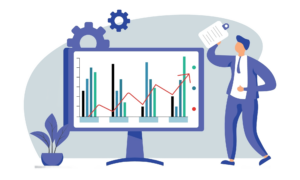While keeping up with PPC developments like automated bidding is important if you want to remain a competitor to your competitors, manual bidding can be useful if you’re limited in terms of budget or consumer data – and if you have more time to spend on your ad campaign.
Why has automated bidding become so popular?

As AI has become an increasingly integrated feature of PPC, automated bidding, creative production and target return on ad spend (your target audience) have come to be well-known features of many successful PPC campaigns.
Through methods like dynamic search ads and responsive search ads, and new tools like Performance Max, Google has promoted a whole plethora of AI campaigns designed to make advertising easier for businesses through Google Ads.
Automated bidding, otherwise known as conversion-based bidding, triggers your budget spend in relation to actual search queries using auction-time technology. It includes a range of factors such as users’ device, location, time zone and language to determine when to spend.
Some of the most common automated bid strategies include: eCPC (enhanced cost per click), target CPA (cost per action) and target ROAS (return on ad spend).
Callum Lenoard, Head of PPC here at Embryo, says:

“Virtually all of my PPC work these days focuses on feeding as much positive data as I can into an account, for the sake of leveraging Automated Bidding.
When compared with Manual Bidding, Automated Bidding not only actions optimisations faster than I can, but it also does so round the clock, 7 days a week.
However, the true power of Automated Bidding lies in what isn’t manually adjustable. Google has access to all sorts of hidden data – our browsing history, shops we visit, people we hang out with, restaurants we eat at, things we wouldn’t even consider… our phones and home devices track it all – and Google reserves all of those “signals” for Automated Bidding.
We’ve been using this AI bidding for 5+ years and we’ve seen the power of it when steered correctly.”
Disadvantages of automated bidding

While there are lots of advantages to automated bidding – ensuring an intelligent use of your ad budget and time efficiency to name a couple – these processes are not without problems.
The downside is that automated technology gives you less control over how exactly your money is spent – beyond the general idea Google gathers from the keywords you submitted in your PPC strategy – you could lose potential conversions on keywords during individual bids.
So, what is manual bidding?
Manual bidding, by contrast, allows you to retain more control over your adverts in ways like setting the maximum (CPC) cost per click for your ads rather than Google setting your bid amounts for you.
Unlike with automated bidding, in which Google adjusts the bid amount automatically, if your bid is too low to compete, your ads won’t be shown. In order to make the most of manual bidding therefore, you need to optimise keyword bids to ensure that your ads do appear for relevant searches.
Which is the best bid strategy for you?
Choosing the right bid strategy for your PPC campaign of course depends on how you want to grow as a company, but generally you will want to increase your visibility in the SERP to generate maximum impressions above your competitors.
As screen size has fluctuated over the years with the introduction of mobile devices, and the digital market has grown exponentially, your ability to rank amongst other brands has become even more important.
However, these days ranking highly is certainly no easy feat, unless you have the right campaign and bid strategy developed for your company.
Make an impression
Targeting impression share is the most obvious bid strategy to maximise your visibility. By bidding with the goal of displaying your ad at the top of the page, or in the most visible position, you have a higher chance of customer engagement. However, the bid amount with this strategy will vary depending on your competitors’ bids.
Within this strategy you have the option of using both exact and phrase match keywords in your campaign. This can be advantageous as phrase match casts a broader net, allowing you to catch a wider range of traffic, and help you discover new keyword opportunities and insights. Through Google intent signals, you can also improve ad intent and gain a healthier return on phrase match keywords.
However, it’s important to be wary that this can sometimes trigger irrelevant or low-quality clicks that waste your budget and lower your conversion rate.
By contrast, exact match gives you the most control over your bids, allowing you to bid higher to a more specific audience. While this might be a cheaper option, as your higher quality clicks generate a higher ROI. On the other hand, exact match keywords can often have a limited reach and require more manual management.
Structuring your campaign
In order to maximise your performance it’s also essential that you implement an effective campaign structure that emphasises consolidation alongside automation. By creating fewer but more detailed campaigns, the data density throughout each campaign is higher which in turn allows AI to learn quicker and generate more accurate automated bid strategies to increase ROAS.
Managing your time and your spend with manual bidding
Ultimately, manual bidding can be laborious and time consuming, but it also allows you to manage your spend more efficiently in order to make the most out of your budget.
The best way to work out how various manual and automated bidding strategies work for your company is to test them out and analyse the results. It’s important that you also keep re-testing to ensure productive campaign management in line with the rapid evolution of the digital market.
FAQs
Answered by Callum Leonard
In what cases would I choose manual bidding over automatic bidding?
Manual bidding is better for new ad accounts with no conversion data to work with. Also, manual bidding is better if there is no conversion data within the last 30 data.
Will bidding ever become fully automated?
Potentially in the future PPC could become more reliant on automation. At the minute without conversion data, this isn’t possible. The human intervention behind PPC campaigns is what usually makes them most successful.
Why is human intervention so important for PPC bidding?
There will always need to be an element of human intervention, especially for new PPC campaigns. All of the steps before a campaign is carried out such as keyword research and writing ad copy, cannot be automated to the same level of quality that humans can achieve.












